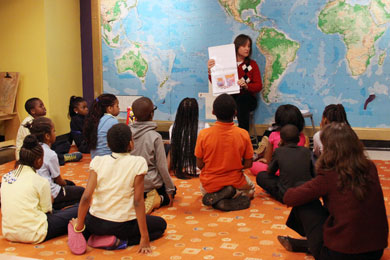MPC’s Bivens Makes Poison Safety Fun for Local Students
"Always Ask First" and other poison prevention tips highlighted in first program of UMB's new children's wellness initiative at Port Discovery.
By: Malissa Carroll
Thursday, January 23, 2014

The gray, rainy day could not dampen the bright eyes and big smiles covering the faces of the 32 students from the YMaryland Group at Johnston Square Elementary School who visited Port Discovery Children’s Museum on Jan. 14.
While spending an afternoon at one of the top 12 children’s museums in the United States -- according to Forbes -- is sure to bring joy to any child’s day, these students were not here for a typical visit. They were on a mission; a mission to learn important healthy habits from the experts at the University of Maryland, Baltimore (UMB).
Launched in January 2014, A Kid’s Port to Discovery: Healthy Habits is a community-based initiative developed by the Office of the President at UMB, in partnership with Port Discovery, to offer instructive -- not to mention, exciting -- health and wellness programs for local elementary school students.
“As a pediatrician, I care deeply about the health and well-being of children,” says Jay A. Perman, MD, president of UMB. “And, as a university president, I care deeply about the community in which we live and work. Our partnership with Port Discovery allows us to teach local school children about a wide range of healthy habits so that they can thrive.”
The initiative features presentations on body and mind health and wellness from faculty and staff from all six of the University’s professional schools.
“The partnership between UMB and Port Discovery allows us to provide a unique experience for our after school students,” says Sarah Zimmerman, STEM and education specialist for Port Discovery. “These students have an opportunity to learn about important health topics from experts in the field, and this knowledge is being passed to the children who need it most.”
One of the first programs offered through this new initiative was presented by Angel Bivens, RPh, MBA, CSPI, public education coordinator for the Maryland Poison Center (MPC). Established in 1972, the MPC is part of the Department of Pharmacy Practice and Science (PPS) at the University of Maryland School of Pharmacy.
“It is an honor to be recognized by the University as an expert in poison safety and to have this time to speak with young children about this important topic,” says Bivens. “It is always refreshing to hear what students have been taught about poison safety in school, and I appreciate the opportunity that has been created through this new initiative with Port Discovery to add to their knowledge base.”
Bivens’ presentation provided students with important poison safety information. “A poison is anything that can harm someone if it is used in the wrong way, by the wrong person, or in the wrong amount,” she said.
To illustrate different examples of poisons, Bivens brought a large white notebook filled with photos of potential poisons, including household cleaners, personal care products, automotive products, lawn and garden products, and medicines. She also spoke about Mr. Yuk, and how Mr. Yuk stickers can help students identify some poisons, but not all.
“There are many poisons that we cannot put Mr. Yuk stickers on,” explained Bivens. “We cannot put Mr. Yuk stickers on different plants and berries, or on the critters we find in the wild. That is why it is important that you never touch, smell, or taste anything without first checking with an adult to make sure it is safe.”
“Always ask first” – that was the message that Bivens worked to impart to students throughout her presentation. To further demonstrate just how important it is for children to ask adults before touching, smelling, or tasting anything, Bivens brought her “Medicine or Candy” chart – a small box that contains a number of unidentified medicines and candies that is sealed with a clear top.
“It was fun, and a little tough, trying to figure out which things were poisons and which were candies. A lot of them looked the same,” said one student about his experience in the program, confirming something that Bivens has known for years.
“Young kids cannot tell the difference between something that is good for them and something that is not,” says Bivens. “We want to make sure that we are not putting that decision making power in their hands – that we are having them ask an adult.”
At the end of her presentation, Bivens gave each student a MPC pencil and closed envelope, which was to remain closed until the students got home and could share it with their parents. “The real message is meant for the parents, because they are the ones who need to change the environment to keep their children safe,” says Bivens.
Richard Manski, DDS, MBA, PhD, professor at the University of Maryland School of Dentistry, joined Bivens at Port Discovery, where he spoke to students about maintaining good oral health.
Programs in this month-long series will continue until Feb. 11. Future presentations will be delivered by faculty and staff from the Schools of Law, Medicine, Nursing , and Social Work, and cover a wide range of health-related topics, including healthy eating, healthy habits, asking for help, bullying and peer pressure, making good decisions, anatomy, and active living and exercise. Upon completing the series, students will be presented with graduation certificates.